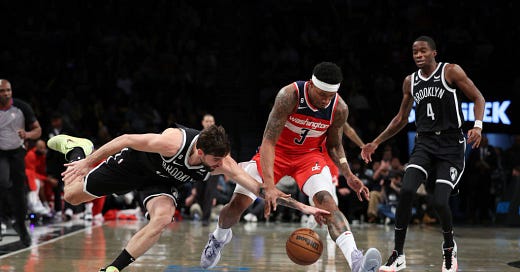Nets’ Defensive Improvement In Run To Inch Over .500 Abetted By Foul Ball
During the first half of the Nets’ 113-107 victory over visiting Washington on Wednesday night, Brooklyn wing Joe Harris was forced to switch onto 7-foot 3 Kristaps Porzingis after a Wizards ball screen. Harris ended up throwing Porzingis to the ground to prevent him from posting up in the lane and was appropriately called for a foul.
I loved it, and maybe Nets Head Coach Jacque Vaughn secretly did as well.
There’s a school of thought that emanates from certain basketball coaches that believes fouling isn’t always such a bad thing. The theory goes that, on the whole, you want your defense to play with a healthy degree of aggressiveness and physicality and that referees are loathe to blow the whistle too often, as it grinds the game to a halt. In the big picture, it’s possible that your defense comes out ahead if the tactics generate enough stops to compensate for the larger number of free throws allowed.
I don’t know if Vaughn really espouses such a view—and I doubt he’d ever admit it--but his team sure is piling up fouls since he took over as Nets Head Coach on November 1. And you know what? It really hasn’t come back to bite them too often as they have won six of their last eight games to inch over the .500 mark for the first time this season.
Brooklyn (12-11) has committed the third-most fouls per game (23) in the league over this span and have been out-attempted from the charity stripe in each of those eight games, with the total discrepancy growing to 89 extra opponent fouls shots after the Wizards’ 34-26 advantage on Wednesday. Using the ensuing free throw percentages, the Nets have been outscored by a total of 51 points in this stretch just on free throws.
Yet the Nets have been no worse than average in terms of points allowed per 100 possessions despite all the fouling. If not for their worrisome rebounding issues, they’d probably be a lot higher than 14th in defensive efficiency since they sport the lowest opponent field goal percentage (43.1%).
Oddly, the last time the Nets were awarded more free throws than their opponent was on November 15 in Sacramento, a 153-121 blowout loss that was the worst defensive performance in franchise history. Brooklyn played that game as if they had no interest in manning up; hence their top 10 rotation players committed just 14 fouls before fourth quarter garbage time. And in the last eight games, the Nets played most clean (15 fouls, 16 Sixers free throw attempts) in Philadelphia, where a Joel Embiid/James Harden/Tyrese Maxey-less group pulled out a 115-106 upset victory on another night where Brooklyn deigned not to defend with the appropriate vigor.
To summarize, Vaughn has coached 16 games: The nine games where the Nets committed more than 20 fouls usually coincided with their better defensive outings and the team went 7-2, with one of the losses a tough 96-94 defeat in Dallas that went down to the wire; Brooklyn was 3-4 in the other seven contests, which included subpar efforts in losses to the Bulls, Kings, Lakers, and Sixers plus Monday’s ugly 109-102 win over injury-depleted Orlando. Those were the games that tended to feature an overabundance of half-hearted efforts to contest shots, with leaving three-point marksmen wide open in the corners a particularly irritating bugaboo.
The fouling you want to limit are those that are related to defensive breakdowns, usually through poor communication. Mostly, though, this team’s excessive hacking can be attributed to its switching scheme that result in mismatches. The Nets, relatively undersized to begin with, have been relying on guards to do a lot of dirty work underneath after their bigs switch on opposing ball screens. It can get chaotic, with Nets defenders scrambling to help and recover in rotations and the opponents feeling freer to attack the paint and offensive glass. Many times, the fouling is just the inevitable end result of the Nets’ battling against difficult odds. So despite being a bit counterintuitive, it’s been a bad competitive sign when they aren’t picking up fouls in these situations.
Obviously, there are risks to fouling too much. The Nets have been shorthanded for various reasons all season, so any foul trouble tests their less-than-stellar depth, particularly up front. Though every game some Net seems to reach five fouls, with guard Seth Curry a bit too handsy on Wednesday, the team has been fortunate in that Ben Simmons has been the only member to foul out (twice) in this period.
The Nets have also been quite lucky in that their opponents haven’t fully capitalized on their freebies. A mere average performance at the line from Washington could have made Wednesday’s game more of a nailbiter. Instead, the Wizards, a 78% free throw shooting team going into the game, missed 11-of-34 attempts. Even smooth-stroking star Bradley Beal, a 90% free throw shooter this season. went just 6-for-9.
On average, NBA teams shoot 78.3% from the foul line this season, per basketball-reference.com. The Nets, however, have stood in the free throw lanes and watched their opponents convert on just 70.7% of their free throw attempts in this stretch and 74.8% for the year, the third-lowest rate in the league. It’s been more pronounced at Barclays Center (thank you Mr. Whammy), which has seen Nets opponents knock down just 70% of their free throws in 11 home games this season, a league low.
It's fair to consider that the Nets’ luck will eventually even out over the marathon that is the NBA season. But looking at how the team is competing lately, especially in all the games where they faced a glaring size differential, you might also conclude that playing with fire through the added physicality is preferable, fouls be damned. The alternative has often yielded uglier results.



